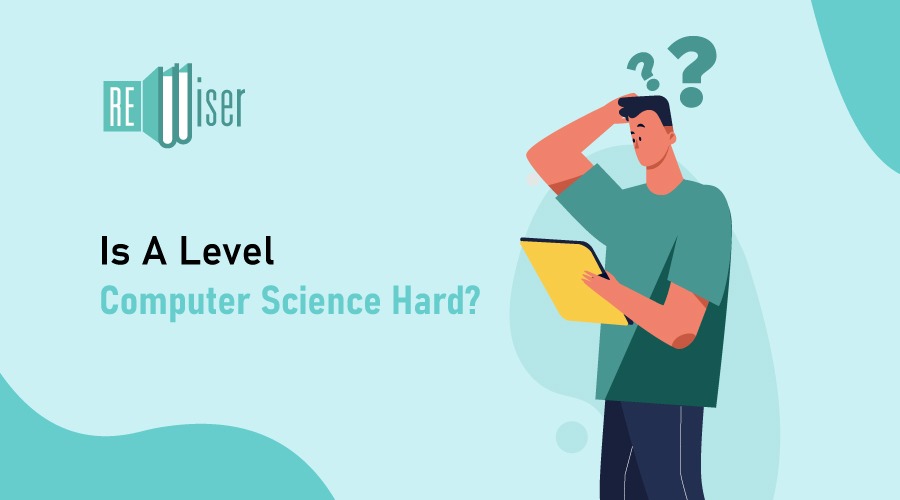
Embarking on the A Level Journey can be both exciting and nerve-wracking, especially when choosing subjects. One subject that often leaves students musing is Computer Science. The question for many students is, “Is A Level Computer Science Hard?” Contrary to misconceptions, prior coding experience is unnecessary and mathematical skill isn’t essential. A Level Computer Science focuses on logic, problem-solving and fundamental computing principles.
While challenges exist in the subject, it proves to be a rewarding journey for those willing to engage, raising essential skills applicable beyond the realm of coding. Let’s unravel the complexities and myths surrounding this subject in simple language.
Table of Content:
- Understanding A Level Computer Science
- Myths and Misconceptions
- What makes A Level Computer Science difficult for an average student?
- Conclusion
Understand A Level Computer Science –
A Level Computer Science introduces students to the world of programming, algorithms, data structures and the underlying principles of how computers operate. It aims to foster problem-solving skills and logical thinking, making it a subject that holds immense practical value in today’s tech-driven world. The course starts from basics, catering to beginners, and fosters a supportive learning environment. A Level of Computer Science cultivates a mindset for breaking down problems, designing solutions, and navigating the dynamic landscapes of technology.
Myths and Misconceptions on Computer Science A Level –
Myth: You need to be a genius in math
Reality: While some mathematical concepts are integrated into Computer Science, you don’t need to be a math prodigy. A good grasp of basic math, logical reasoning, and problem-solving skills are more crucial.
Myth: It’s all about coding, and coding is impossible
Reality: Coding is indeed a part of Level Computer Science, but the emphasis is on understanding the logic behind it. You don’t need to memorize complex code; instead, you’ll learn to think logically and algorithmically.
Myth: You must have prior programming experience
Reality: A Level Computer Science starts from scratch. You don’t need any prior coding experience. The course is designed to cater for beginners, taking them through the basics and gradually advancing.
Myth: It’s only for those who want a career in IT
Reality: While A Level Computer Science provides a strong foundation for IT careers, its skills are transferable. Logical thinking, problem-solving and computational skills acquired in this course are valuable in various fields.
Myth: Coding is impossible
Reality: Coding involves giving instructions to a computer. The course teaches about breaking down issues, designing solutions, and communicating them effectively on a laptop.
Myth: Algorithms are only for geniuses
Reality: Algorithms are step-by-step procedures for solving problems. A Level Computer Science introduces you to creating algorithms, helping you understand the process of problem-solving.
Myth: Data structures are too complex
Reality: Data structures are ways of organizing and storing data efficiently. A level computer science will guide you in understanding these structures, empowering you to choose the right one for a task.
Myth: You need to be a logical genius
Reality: Logical thinking is cultivated in A Level Computer Science. It involves dissecting issues into digestible components and formulating methodical fixes, a skill that is advantageous in many facets of life.
What makes A Level Computer Science difficult for an average student?
A Level Computer Science can be challenging for an average student for many reasons. Some of these are –
Abstract Concepts – The subject involves understanding abstract concepts like Algorithms, data structures, and computational thinking, which may be challenging for students who struggle with abstract reasoning.
Mathematical Elements – While not heavily math-dependent, the subject does involve some mathematical concepts. Students who find math challenging might face difficulties in certain aspects of the subject.
Problem Solving Complexities –
Students must be able to break down complex problems into manageable steps as part of the course’s emphasis on problem-solving techniques. Those who are not accustomed to solving complex issues may find this procedure intimidating.
New Programming Concepts –
It might be intimidating to learn programming languages and comprehend coding fundamentals, particularly for students who have never done any coding before.
Rapid Technological Changes –
Computer science is a constantly evolving field. Students who go towards more stable and predictable disciplines may find it difficult to stay adaptive and keep up with the latest technological advancements.
Assessment Methods –
A Level Computer Science examination style can have both theoretical and practical components, which might be unsettling for students who are more comfortable with one kind of evaluation than another.
Also Read – How do you get an A* in A Level Biology?
Conclusion –
There are obstacles in Computer Science A Level, but they are well worth overcoming. It’s not about being a genius; instead, it’s about honing abilities that are becoming more and more important in today’s technologically advanced society. Beyond the classroom, logical reasoning, problem-solving skills, and an understanding of computing principles are valuable attributes.
If you need additional support for your A Level Computer Science Syllabus, then you can contact Team ReWiser: Contact Us – ReWiser
Is computer science at the A Level difficult? It could be a little tricky at first, but with the correct attitude, encouragement, and openness to learning, the journey can be incredibly fulfilling. Myths shouldn’t stop you from exploring and learning about the fantastic field of Level Computer Science.

